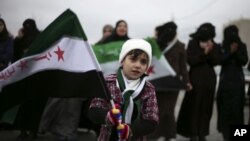UNITED NATIONS —
The United Nations-Arab League envoy for Syria, Lakhdar Brahimi, warned Tuesday that Syria “is being destroyed” and called on a divided U.N. Security Council to take action to prevent the situation from escalating further.
Brahimi held private talks with the 15-nation Security Council for two hours. Afterwards, he told reporters that he is calling on the council to put aside its differences and take action.
“Syria is being destroyed bit-by-bit," said Brahimi. "And in destroying Syria, the region is being pushed into a situation that is extremely bad and extremely important for the entire world. That is why I believe the Security Council simply cannot continue to say we are in disagreement, therefore, let’s wait for better times. I think they have got to grapple with this problem now.”
The council has been bitterly divided for nearly a year over how to address the crisis. Russia and China have three times vetoed resolutions obstructing council action, garnering international criticism for shielding President Bashar al-Assad’s regime.
The United Nations estimates that more than 60,000 people have died as a result of the nearly two-year-old conflict, and the toll continues to rise. Hours before Brahimi addressed the Security Council in New York, Syrians worked to retrieve and identify the bodies of dozens of young men bound and executed and dumped in a river in Aleppo.
Brahimi said the communiqué that came out of an international meeting on Syria last June in Geneva provides many elements of what is needed for a political solution to the crisis, but that it needs further Security Council action to be implemented.
He said one critical element is the creation of a transitional governing body with full executive powers, but that the authors of the communiqué were deliberately ambiguous about it and must be specific now.
“That ambiguity has to be lifted now," he said. "You’ve got to say what these full executive powers mean. And for me, and I think for many people, it means exactly that - all powers of state have to go to that [transitional] government.”
The veteran diplomat, who took up his post after former U.N. secretary-general Kofi Annan quit in frustration in August, dismissed rumors that he is considering resigning. He said the United Nations has no choice but to remain engaged on this crisis and that he would continue to persevere.
The envoy said he would continue his discussions Tuesday night over dinner with the ambassadors of the permanent five members of the Security Council.
On Wednesday, international donors will meet in Kuwait to pledge funds for Syrians affected by the crisis. The United Nations has appealed for $1.5 billion to assist some 5 million people inside and outside the country for the next six months. The United States has already announced it will give an additional $155 million to help meet urgent humanitarian needs.
Brahimi held private talks with the 15-nation Security Council for two hours. Afterwards, he told reporters that he is calling on the council to put aside its differences and take action.
“Syria is being destroyed bit-by-bit," said Brahimi. "And in destroying Syria, the region is being pushed into a situation that is extremely bad and extremely important for the entire world. That is why I believe the Security Council simply cannot continue to say we are in disagreement, therefore, let’s wait for better times. I think they have got to grapple with this problem now.”
The council has been bitterly divided for nearly a year over how to address the crisis. Russia and China have three times vetoed resolutions obstructing council action, garnering international criticism for shielding President Bashar al-Assad’s regime.
The United Nations estimates that more than 60,000 people have died as a result of the nearly two-year-old conflict, and the toll continues to rise. Hours before Brahimi addressed the Security Council in New York, Syrians worked to retrieve and identify the bodies of dozens of young men bound and executed and dumped in a river in Aleppo.
Brahimi said the communiqué that came out of an international meeting on Syria last June in Geneva provides many elements of what is needed for a political solution to the crisis, but that it needs further Security Council action to be implemented.
He said one critical element is the creation of a transitional governing body with full executive powers, but that the authors of the communiqué were deliberately ambiguous about it and must be specific now.
“That ambiguity has to be lifted now," he said. "You’ve got to say what these full executive powers mean. And for me, and I think for many people, it means exactly that - all powers of state have to go to that [transitional] government.”
The veteran diplomat, who took up his post after former U.N. secretary-general Kofi Annan quit in frustration in August, dismissed rumors that he is considering resigning. He said the United Nations has no choice but to remain engaged on this crisis and that he would continue to persevere.
The envoy said he would continue his discussions Tuesday night over dinner with the ambassadors of the permanent five members of the Security Council.
On Wednesday, international donors will meet in Kuwait to pledge funds for Syrians affected by the crisis. The United Nations has appealed for $1.5 billion to assist some 5 million people inside and outside the country for the next six months. The United States has already announced it will give an additional $155 million to help meet urgent humanitarian needs.





